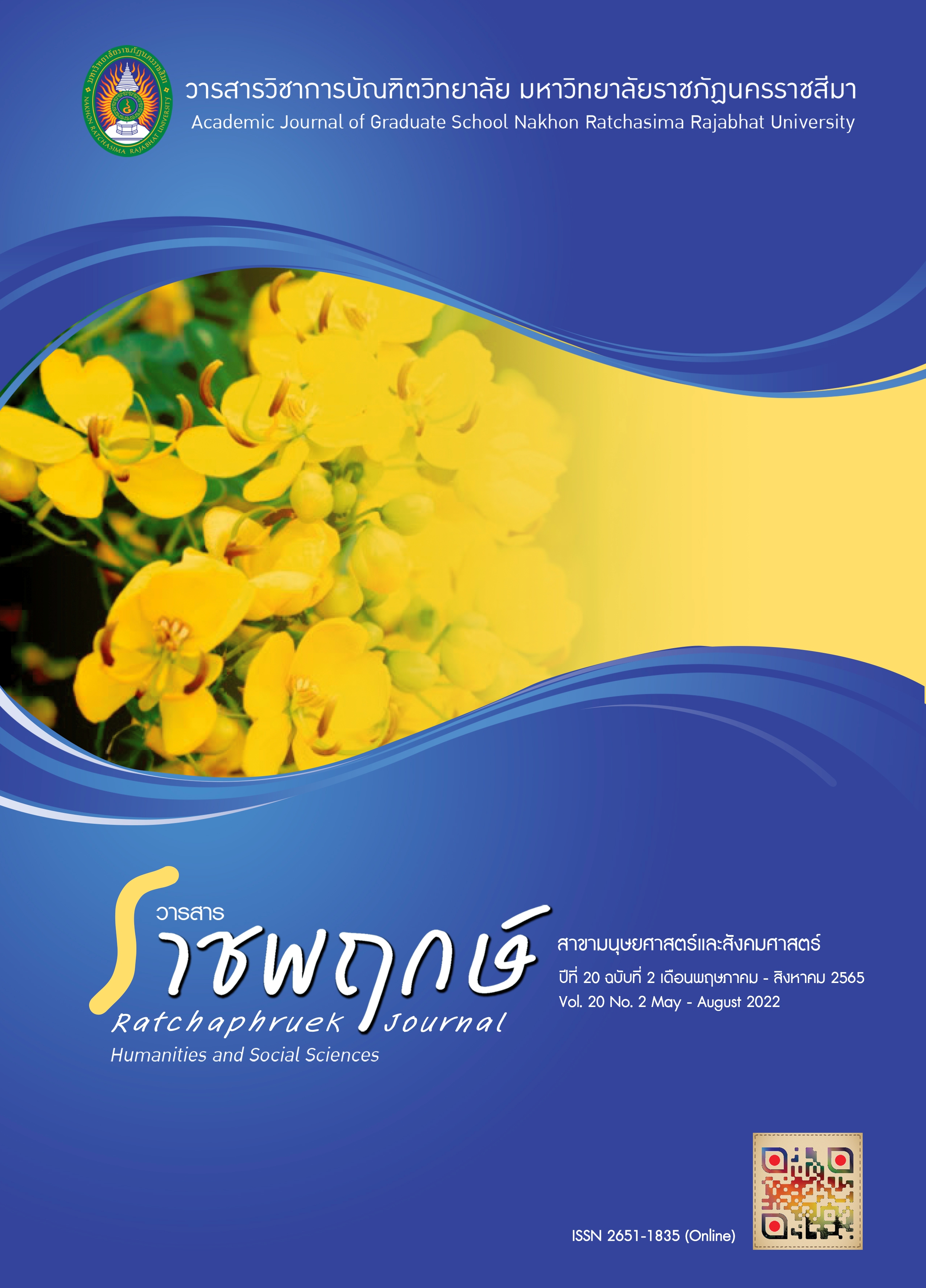Model of Teachers’ Potential in Learning Management to Enhance of Student’s Thinking Skill Based on Local Wisdom
Main Article Content
Abstract
The purposes of this research were to study 1) the needs and problems of learning management (LM) to enhance of student’s thinking skill, 2) the effectiveness of LM model to enhance of student’s thinking skill based on local wisdom, 3) the results of using LM model, and 4) satisfaction in LM model based on local wisdom. The samples in the study of needs were 318 teachers, validation model effectiveness by 5 experts, and the samples in using LM model were 15 teachers and 23 students The research instruments were questionnaire, knowledge test, LM ability form and thinking skills test. The data were analyzed using PNI modified, mean, standard deviation and Wilcoxon signed-rank test. The findings were as follows: 1) The results found that the most important aspects were LM, 2) The models of model of teachers’ potential had 5 elements: principles, objectives, content, the process of activities, and evaluation, 3) The teachers had a statistically significantly higher level of comprehension after training more than before training at .05 level, the quality of competence in LM was at a high level, and student had a statistically significantly higher level at .05 level, and 4) The satisfaction with the model of teachers’ potential in LM to enhance of student’s thinking skill based on local wisdom was at a high level.
Article Details

This work is licensed under a Creative Commons Attribution-NonCommercial-NoDerivatives 4.0 International License.
References
กระทรวงศึกษาธิการ. (2545). พระราชบัญญัติการศึกษาแห่งชาติ พุทธศักราช 2542 (ฉบับที่ 2) และที่แก้ไขเพิ่มเติม พุทธศักราช 2545. กรุงเทพฯ: สยามสปอร์ต ซินดิเค.
ถนอมพร เลาหจรัสแสง. (2557). ทักษะแห่งศตวรรษที่ 21 เพื่อการพัฒนาอาจารย์ของมหาวิทยาลัยเชียงใหม่. สืบค้นเมื่อ 1 ธันวาคม2560, จาก http://www.pharmacy.cmu.ac.th/unit/unit_files/files_download/2014-04-10.pdf
ทิศนา แขมมณี. (2556). ศาสตร์การสอน: องค์ความรู้เพื่อการจัดกระบวนการเรียนรู้ที่มีประสิทธิภาพ (พิมพ์ครั้งที่ 17). กรุงเทพฯ: จุฬาลงกรณ์มหาวิทยาลัย.
ธนาพล บัวคำโคตร และไพบูลย์ ลิ้มมณี. (2563). แนวทางพัฒนาครูด้านการจัดการเรียนรู้ในศตวรรษที่ 21 โดยใช้แนวคิดชุมชนแห่งการเรียนรู้ทางวิชาชีพ สังกัดสำนักงานเขตพื้นที่การศึกษามัธยมศึกษา เขต 33. วารสารมหาจุฬานาครทรรศน์, 7(8), น. 89-103.
ธีรดา สมพะมิตร, แสงระวี ปัญญา และชูศรี สุวรรณ. (2558). ผลการใช้ชุดกิจกรรมของเล่นภูมิปัญญาท้องถิ่นเพื่อพัฒนาทักษะกระบวนการทางวิทยาศาสตร์ของนักเรียนชาติพันธุ์ ชั้นประถมศึกษาปีที่ 2. วารสารบัณฑิตศึกษา มหาวิทยาลัยราชภัฏเชียงราย, 8(18), น. 67-74.
ยุทธการ สืบแก้ว. (2551). การพัฒนาแบบวัดอภิปัญญาสำหรับนักเรียนมัธยมศึกษาตอนต้น (วิทยานิพนธ์มหาบัณฑิต, จุฬาลงกรณ์มหาวิทยาลัย).
เยาวภา โชติวิชัย. (2557). การพัฒนาชุดการเรียนวิชาภูมิปัญญาท้องถิ่นเพื่อพัฒนาการคิดวิเคราะห์ของนักศึกษามหาวิทยาลัยราชภัฏจันทรเกษม. จันทรเกษมสาร, 20(38), น. 51-58.
รุ่งลาวัลย์ ละอำคา. (2558). รูปแบบการเรียนการสอนโดยสร้างศรัทธาและโยนิโสมนสิการ: เส้นทางแห่งปัญญาเพื่อการพัฒนาครูและศิษย์. วารสารวิจัยเพื่อพัฒนาสังคมและชุมชน มหาวิทยาลัยราชภัฏมหาสารคาม, 2(4), น. 19-28.
วาโร เพ็งสวัสดิ์. (2553). การวิจัยพัฒนารูปแบบ. วารสารมหาวิทยาลัยราชภัฏสกลนคร, 2(4), น. 1-15.
วิจารณ์ พานิช. (2557). นวัตกรรมสู่การเป็นประเทศแห่งการศึกษา. สืบค้นเมื่อ 1 ธันวาคม 2560, จาก https://www.gotoknow.org/posts/565909
วิชัย วงษ์ใหญ่ และมารุต พัฒผล. (2562). การจัดการเรียนรู้เพื่อพัฒนาการคิดวิเคราะห์. กรุงเทพฯ: ศูนย์ผู้นำนวัตกรรมหลักสูตรและการเรียนรู้.
สุรางค์ โค้วตระกูล. (2550). จิตวิทยาการศึกษา (พิมพ์ครั้งที่ 3). กรุงเทพฯ: จุฬาลงกรณ์มหาวิทยาลัย.
สุวิมล ว่องวาณิช. (2558). การวิจัยประเมินความต้องการจำเป็น (พิมพ์ครั้งที่ 3). กรุงเทพฯ: จุฬาลงกรณ์มหาวิทยาลัย.
สำนักงานคณะกรรมการการศึกษาขั้นพื้นฐาน. (2562). แนวทางการนิเทศเพื่อพัฒนาและส่งเสริมการจัดการเรียนรู้เชิงรุก (Active learning) ตามนโยบายลดเวลาเรียนเพิ่มเวลารู้. กรุงเทพฯ: หน่วยศึกษานิเทศก์.
สำนักงานรับรองมาตรฐานและประเมินคุณภาพการศึกษา. (2560). บทสรุปผู้บริหารโครงการสังเคราะห์ผลการประเมินคุณภาพภายนอกรอบสาม (พ.ศ. 2554-2558) ระดับการศึกษาขั้นพื้นฐาน. สืบค้นเมื่อ 1 ธันวาคม 2560, จาก http://www.http://www.onesqa.or.th /upload/download/201704271505239.pdf
Brunner, J. (1977). The process of education. Cambridge: Harvard University.
Gagné, M., Briggs, J. and Wager, W. (1992). Principle of Instructional Design (4th ed.). San Diego: Harcourt Brace.
Joyce, B. and Weil, M. (2009). Information Processing Model of Teaching (8th ed.). Boston: Allyn and Bacon.
Koffka, K. (1935). Principles of Gestalt Psychology. San Diego: Harcourt Brace.
Meyerson, J. (1993). Exploring reading instructional decisions though a reflective activity: The first step in the change process. Journal of Educational and Psychological Consultation, 4(2), pp. 153-168.


